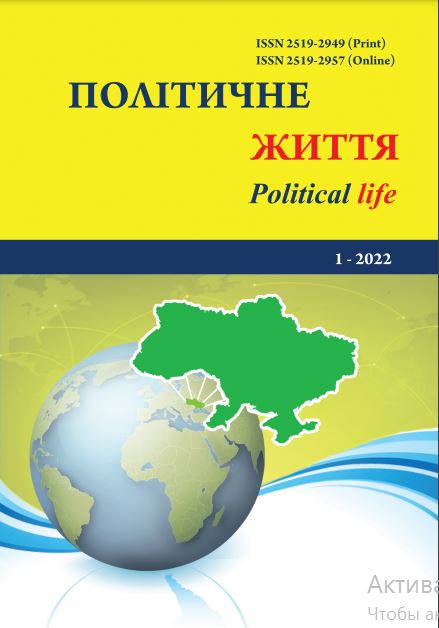The formation of a new world order as an object of political science research
DOI:
https://doi.org/10.31558/2519-2949.2022.1.10Keywords:
new world order; political subjectivity; subjectlessness of politics; complex systemsAbstract
The article deals with the existing scientific approaches to the interpretation of the term "world order". Based on the analysis they are systematized into three key directions: institutional, ideological (axiological), and actor approach. Within the framework of the latter approach, there is a transition from the study of poles or centers of power to a statement of the fact of polycentricity of the new world order. For the completeness of the political science study of the world order the author considers it necessary to take into account besides the institutional design, configuration of actors, and value paradigm also the nature of society in which such an order is formed (post-information or network) and the state of globalization processes that determine the spatial characteristics of the world order (de-globalization, regionalization, and localization). Despite the difference in interpretations, different scientific schools are united by the thesis of the modern liberal world order crisis. The scientific debate revolves around the question of whether the world order is in a state of definite transition or whether the current non-equilibrium state can be considered as a new world order. The synergetic paradigm, or complexity theory, proposed as a research methodology, provides an answer. According to it, the formation of new world order is seen as a nonequilibrium nonlinear process defined by a dynamic synthesis of order and chaos. If there are specific political actors (institutions, interest groups, individuals) in the political space, their influence on the transformation of the political space is possible at bifurcation points and is predominantly random. This defines subjectlessness as a trend in the formation of new world order. From the point of view of finding a methodological basis for the research, the existing models of system dynamics, cyclic models, and simulation modeling were considered. It is determined that for the study of the new world order as a nonlinear dynamic complex system, it is advisable to analyze the megatrends of world politics and deconstruct them using the "method-assemblage" of a constantly changing reality.
References
Ikenberry J. After Victory. Institutions, Strategic Restraint, and the Rebuilding of Order After Major Wars. Princeton, N.J. 2001. 312 p.
Никитин А. И. Современный миропорядок: его кризис и перспективы. Полис. Политические исследования. 2018. № 6. С. 32-46. DOI: https://doi.org/10.17976/pps/2018.06.03 (дата звернення: 03.09.2021).
Acharya A. The End of American World Order. Cambridge: Polity Press, 2014. P. 1-11.
Баталов Э. Я. “Новый мировой порядок”: к методологии анализа. Полис. Политические исследования. 2003. № 5. С. 25-37. DOI: https://doi.org/10.17976/jpps/2003.05.04 (дата звернення: 03.09.2021).
Nye Jr., Joseph S. Will the Liberal Order Survive? The History of an Idea. Foreign Affairs. 2017, vol. 96, no. 1, pp. 10-16.
Munich Security Report 2019. The Great Puzzle: Who Will Pick Up the Pieces? URL: https://www.securityconference.de/en/publications/munich-security-report/munich-security-report-2019 (дата звернення: 11.09.2021)
Жизнь в осыпающемся мире. Ежегодный доклад Клуба «Валдай». 15.10.2018 URL: https://ru.valdaiclub.com/a/reports/zhizn-v-osypayushchemsya-mire/ (дата звернення: 08.09.2021).
COVID-19 and World Order: The Future of Conflict, Competition, and Cooperation/ Brands, Hal and Francis J. Gavin. Johns Hopkins University Press, 2020. DOI: doi:10.1353/book.77593 (дата звернення: 07.09.2021).
Цыганков А.П. 2019. Эпоха полураспада: от миропорядка к миропереходу. Россия в глобальной политике. Т. 17. № 2. С. 20-31. URL: https://globalaffairs.ru/number/Epokha-poluraspada-otmiroporyadka-k-miroperekhodu-20029 (дата звернення: 07.09.2021).
Бородкин Л.И. Методология анализа неустойчивых состояний в политико-исторических процессах. Международные процессы. Том 3. № 1(7). 2005. С. 4-16.
Князева Е.Н., Курдюмов С.П. Основания синергетики. Человек, конструирующий себя и свое будущее. М.: КомКнига, 2006. 345 c.
Бузский М.П. Современные концепции социальной синергетики // Глобализация: синергетический подход / Под общ. ред. В.К. Егорова. 2002. URL: http://spkurdyumov.ru/globalization/sovremen nye-koncepcii-socialnoj-sinergetiki/ (дата звернення: 28.09.2021)
Гелих О.Я., Князева Е.Н. Управление и синергетика: учебное пособие. СПб.: Книжный Дом, 2012. 248 с.
Польовий М. А. Політичні процеси: теорія та практика моделювання: монографія / М. А. Польовий. Одеса : Фенікс, 2011. 288 с.
Дегтерев Д., Истомин И. Системное моделирование международных отношений. Мировая экономика и международные отношения. 2015, № 11, c. 17–30 DOI:10.20542/0131-2227-2015-59-11-17-30 (дата звернення: 30.09.2021)
Майнцер К. Сложность бросает нам вызов в ХХІ веке. Динамика и самоорганизация в век глобализации. URL: http://spkurdyumov.ru/forecasting/slozhnost-brosaet-nam-vyzov-v-xxi-veke-klaus-majncer/ (дата звернення: 29.09.2021)
Ло Д. После метода: беспорядок и социальная наука. М.: Изд-во Института Гайдара, 2015. 352 с.

